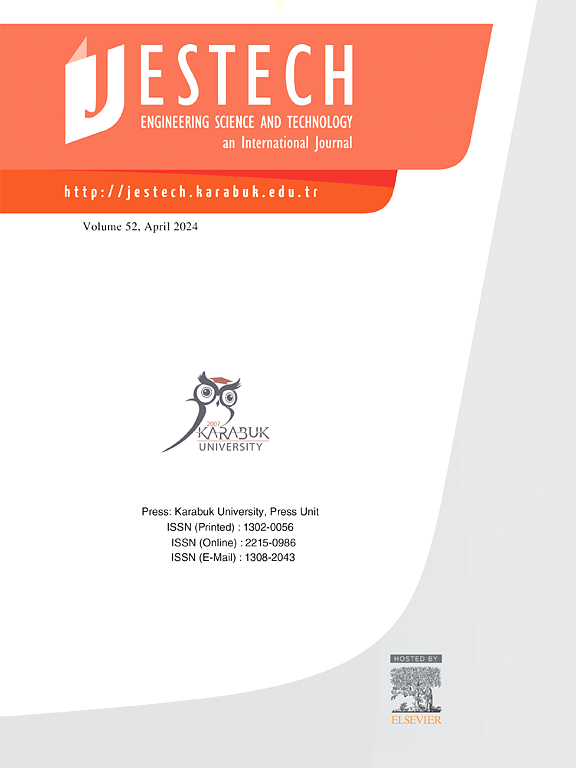A robust wrapper-based feature selection technique based on modified teaching learning based optimization with hierarchical learning scheme
IF 5.1
2区 工程技术
Q1 ENGINEERING, MULTIDISCIPLINARY
Engineering Science and Technology-An International Journal-Jestech
Pub Date : 2025-01-01
DOI:10.1016/j.jestch.2024.101935
引用次数: 0
Abstract
Feature selection is a pivotal preprocessing step in deploying machine learning solutions, aimed at removing redundant features from datasets while preserving predictive accuracy. Despite the popular use of wrapper-based feature selection techniques with metaheuristic search algorithms (MSAs) such as Teaching Learning Based Optimization (TLBO), balancing exploration and exploitation in identifying optimal feature subsets remains a fundamental challenge. This paper introduces an advanced wrapper-based feature selection method utilizing an enhanced TLBO variant, termed Modified TLBO with Hierarchical Learning Scheme (MTLBO-HLS). MTLBO-HLS incorporates significant enhancements in both teacher and learner phases to better balance exploration and exploitation, thus improving robustness in solving complex problems like feature selection. Specifically, the Multi-Hierarchical Teacher Phase (MH-TP) divides the MTLBO-HLS population into multiple group tiers based on fitness, where learners are guided by superior peers from better tiers. The Dynamic Peers Interaction Based Learner Phase (DPI-LP) enriches the learning process by enabling interactions with single and multiple elite peers and retaining valuable knowledge across dimensions. Extensive simulations demonstrate MTLBO-HLS’s superior performance in feature selection, consistently identifying the smallest feature subsets and achieving the highest classification accuracies across various datasets. These results highlight its potential to drive industrial innovation through enhanced machine learning model efficiency and accuracy.
求助全文
约1分钟内获得全文
求助全文
来源期刊

Engineering Science and Technology-An International Journal-Jestech
Materials Science-Electronic, Optical and Magnetic Materials
CiteScore
11.20
自引率
3.50%
发文量
153
审稿时长
22 days
期刊介绍:
Engineering Science and Technology, an International Journal (JESTECH) (formerly Technology), a peer-reviewed quarterly engineering journal, publishes both theoretical and experimental high quality papers of permanent interest, not previously published in journals, in the field of engineering and applied science which aims to promote the theory and practice of technology and engineering. In addition to peer-reviewed original research papers, the Editorial Board welcomes original research reports, state-of-the-art reviews and communications in the broadly defined field of engineering science and technology.
The scope of JESTECH includes a wide spectrum of subjects including:
-Electrical/Electronics and Computer Engineering (Biomedical Engineering and Instrumentation; Coding, Cryptography, and Information Protection; Communications, Networks, Mobile Computing and Distributed Systems; Compilers and Operating Systems; Computer Architecture, Parallel Processing, and Dependability; Computer Vision and Robotics; Control Theory; Electromagnetic Waves, Microwave Techniques and Antennas; Embedded Systems; Integrated Circuits, VLSI Design, Testing, and CAD; Microelectromechanical Systems; Microelectronics, and Electronic Devices and Circuits; Power, Energy and Energy Conversion Systems; Signal, Image, and Speech Processing)
-Mechanical and Civil Engineering (Automotive Technologies; Biomechanics; Construction Materials; Design and Manufacturing; Dynamics and Control; Energy Generation, Utilization, Conversion, and Storage; Fluid Mechanics and Hydraulics; Heat and Mass Transfer; Micro-Nano Sciences; Renewable and Sustainable Energy Technologies; Robotics and Mechatronics; Solid Mechanics and Structure; Thermal Sciences)
-Metallurgical and Materials Engineering (Advanced Materials Science; Biomaterials; Ceramic and Inorgnanic Materials; Electronic-Magnetic Materials; Energy and Environment; Materials Characterizastion; Metallurgy; Polymers and Nanocomposites)
 求助内容:
求助内容: 应助结果提醒方式:
应助结果提醒方式:


